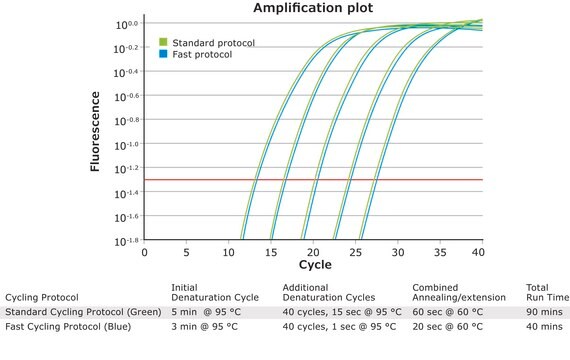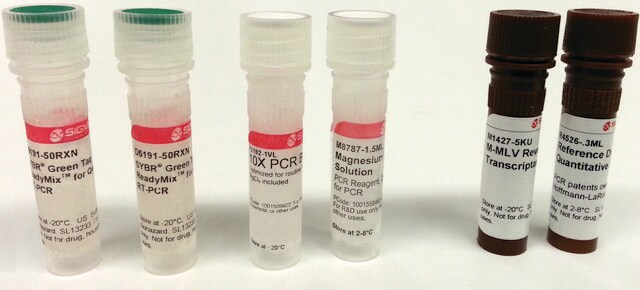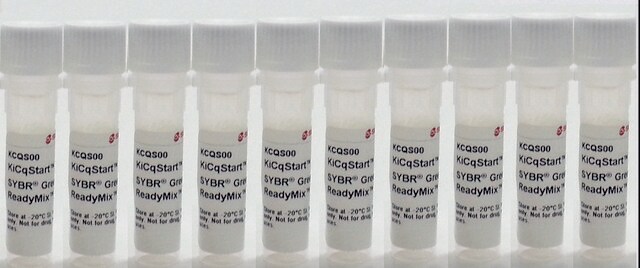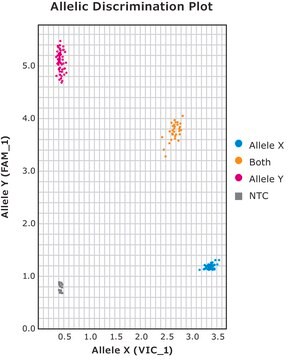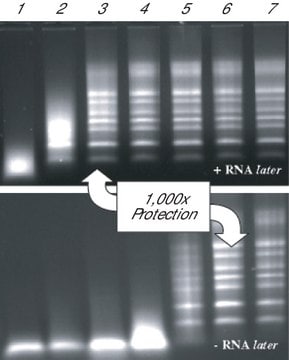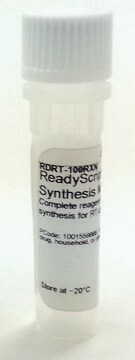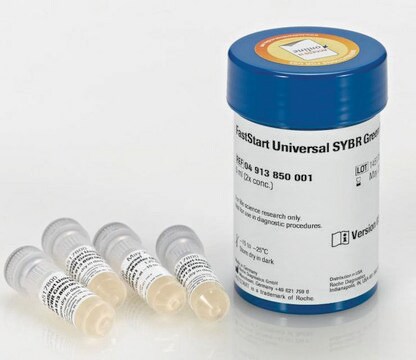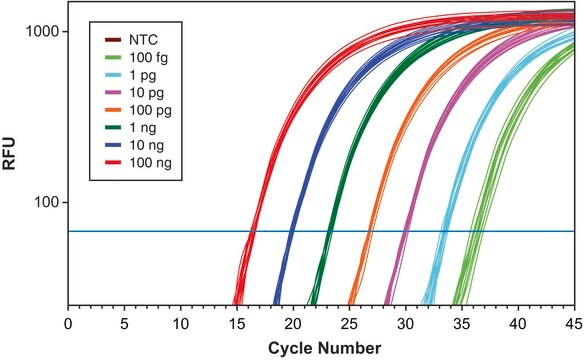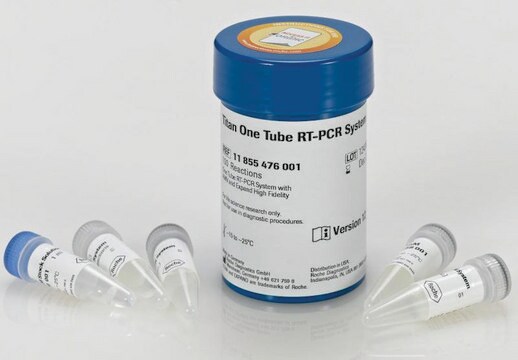SF1UKB
Roche
KAPA SYBR® FAST One-Step
suitable for RT-PCR, 2 ×, Universal
Synonyme(s) :
SYBR, qPCR
About This Item
Produits recommandés
Niveau de qualité
Utilisation
sufficient for 100 reactions
sufficient for 1000 reactions
sufficient for 500 reactions
Durée de conservation
≤6 mo.
Caractéristiques
dNTPs included: no
hotstart: no
Conditionnement
kit of 1 mL (100 x 20 μL rxn; KK4650)
kit of 10 mL (1000 x 20 μL rxn; KK4652)
kit of 5 mL (500 x 20 μL rxn; KK4651)
Fabricant/nom de marque
Roche
Concentration
2 ×
Technique(s)
RT-PCR: suitable
qPCR: suitable
Entrée
purified DNA
Compatibilité
for use with Agilent Mx3000P
for use with Agilent Mx3005P
for use with Agilent Mx4000
for use with Applied Biosystems® 5700
for use with Applied Biosystems® 7000
for use with Applied Biosystems® 7300
for use with Applied Biosystems® 7500
for use with Applied Biosystems® 7700
for use with Applied Biosystems® 7900HT
for use with Applied Biosystems® ViiA 7
for use with QuantStudio™
for use with StepOne™
for use with StepOnePlus™
Méthode de détection
SYBR® Green
Température de stockage
−20°C
Vous recherchez des produits similaires ? Visite Guide de comparaison des produits
Description générale
KAPA SYBR FAST One-Step qRT-PCR Kits contain M-MuLV reverse transcriptase, RNase inhibitor, and a novel DNA polymerase evolved via directed evolution.
Application
- Gene expression analysis
- Low-copy gene detection
- Microarray validationmiRNA research
- Gene knockdown validation
- Real-time quantitative reverse transcription-PCR (qRT-PCR)
- RNAi and miRNA research
Caractéristiques et avantages
- Consistently higher amplification efficiencies for accurate qPCR.
- Higher fluorescence, earlier Cq values and improved reaction efficiencies.
Amplify across a broad range of target lengths
- Robust performance independent of amplicon size.
- Improve sensitivity and reproducibility
- Accurate interrogation across a wide range of RNA template concentrations.
Quick Notes:
- This kit contains wild-type M-MuLV and an engineered enzyme optimized for qPCR using SYBR Green I dye chemistry.
- The 2X master mix contains a proprietary buffer. Together with the novel enzyme, this improves amplification efficiency of both GC- and AT-rich targets.
- Use only gene-specific primers for one-step qRT-PCR.
- Optimal cDNA synthesis is achieved at 42°C for 5 min.
- 3 min at 95°C is sufficient for RT inactivation and DNA polymerase activation.
- For 3-step cycling, use 20 sec for primer annealing and 1 sec for extension/data acquisition at 72°C.
- Do not exceed 25 μL reaction volumes.
Qualité
Notes préparatoires
The SYBR Green I dye contained in the KAPA SYBR FAST qPCR Master Mix (2X) and ROX/fluorescein dyes (depending on kit configuration) are light sensitive. Exposure to direct light for an extended period of time will result in loss of fluorescent signal intensity.
KAPA SYBR FAST qPCR Master Mix (2X) is stable through 30 freeze-thaw cycles. Ensure that all reagents are stored protected from light at -20°C when not in use. When protected from light, reagents are stable in the dark at 4°C for at least one week and may be stored at this temperature for short-term use provided that they do not become contaminated with microbes and/or nucleases.
Autres remarques
Informations légales
Composants de kit seuls
- KAPA RT Mix
- dUTP
- KAPA SYBR® FAST DNA Polymerase
- reaction buffer
- dNTPs
- SYBR® Green I dye
- MgCl2 2.5 mM
Mention d'avertissement
Warning
Mentions de danger
Conseils de prudence
Classification des risques
STOT SE 2
Code de la classe de stockage
12 - Non Combustible Liquids
Classe de danger pour l'eau (WGK)
WGK 1
Point d'éclair (°F)
does not flash
Point d'éclair (°C)
does not flash
Certificats d'analyse (COA)
Recherchez un Certificats d'analyse (COA) en saisissant le numéro de lot du produit. Les numéros de lot figurent sur l'étiquette du produit après les mots "Lot" ou "Batch".
Déjà en possession de ce produit ?
Retrouvez la documentation relative aux produits que vous avez récemment achetés dans la Bibliothèque de documents.
Les clients ont également consulté
Articles
An overview of directed evolution and the methods for generating proteins with optimized or entirely new functions.
Notre équipe de scientifiques dispose d'une expérience dans tous les secteurs de la recherche, notamment en sciences de la vie, science des matériaux, synthèse chimique, chromatographie, analyse et dans de nombreux autres domaines..
Contacter notre Service technique